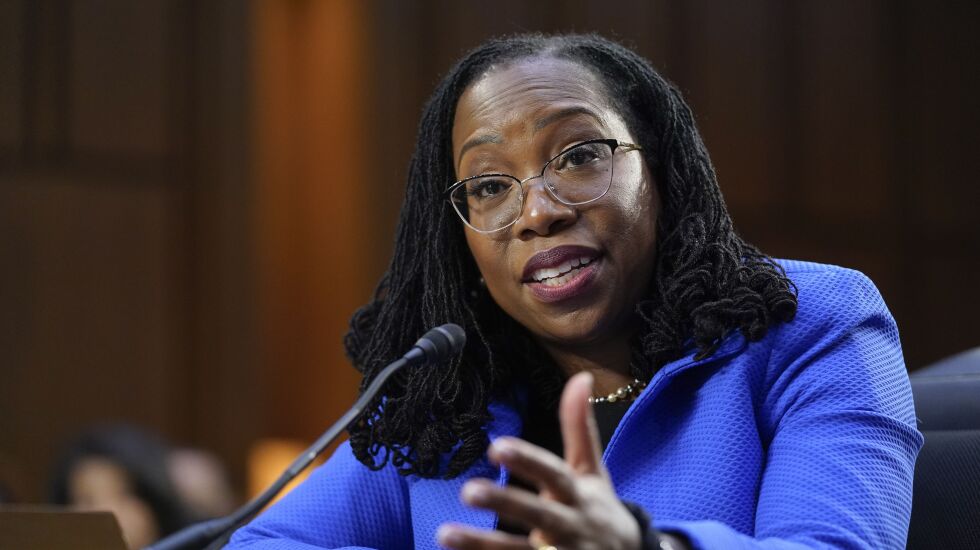
WASHINGTON — With Sen. Dick Durbin, D-Ill., wielding the gavel as chairman of the Senate Judiciary Committee, President Joe Biden outpaced Donald Trump and Barack Obama in confirming federal judges at the midpoint of their respective terms.
The new judges are part of a historic transformation of the federal bench in terms of race, gender, ethnicity and experience, including in federal courtrooms in Chicago. Until Biden, most federal judges were white males, with the door closed to almost all other lawyers.
“I’m pretty proud of what we’ve been able to achieve,” said Durbin, who starts a second term as committee chair when the new 118th Congress kicks off on Tuesday.
Durbin also continues as the Senate majority whip, the No. 2 Democrat in the Senate, a post he has held since 2005.
Including Supreme Court justices, at the end of two years:
Biden confirmed 97 federal judges.
Trump confirmed 85 federal judges.
Obama confirmed 43 federal judges.
Beyond the numbers for the lifetime appointments, Biden has made diversifying the federal judiciary — Supreme Court, appeals, and district court judges — a priority.
With his nominations, Biden is overseeing a historic push for diversity, capped with the confirmation last year of Ketanji Brown Jackson to the Supreme Court, making her the first Black woman to serve as justice.

“I’m not taking anything away from white male former prosecutors, but that was generally the category of individuals who were appointed to the federal judiciary in the past,” Durbin told the Sun-Times.
And while many of those judges showed “no prejudice in the courtroom as far as I’m concerned, we felt that people who walked into our U.S. federal courtrooms should see, sitting on the bench, the diversity of our country,” Durbin said.
By the end of the 117th Congress, Durbin’s Senate Judiciary Committee held hearings for 136 nominees, of which 97 were confirmed. Republicans, led by Minority Leader Mitch McConnell, R-Ky., were in no rush, Durbin said. With the Senate at a 50-50 split, Durbin’s panel had 11 Democrats and 11 Republicans.
“We have had to labor not only as an 11-to-11 committee, [but] we also had to face the reality that Mitch McConnell was not going to cut us any slack. Every nominee had to go through a pretty rigorous time-consuming process before they could be approved on the floor,” Durbin said. Not every nominee got a vote by the end of the 117th Congress because “we just ran out of time.”
The prospects of the remaining nominees to be confirmed by the new Congress are virtually certain, especially since Senate Democrats now have a stronger hand, with 51 members on their side. While the exact number has not been finalized, Durbin will be able to speed things up with a Democratic majority on his committee.
The nominees who did not get a vote by the end of the session must be renominated by Biden, though that’s just a formality.
Taken as a whole, the 136 nominees, according to an analysis by Durbin’s office, break down this way:
- 94 women — 69%
- 90 people of color — 66%
- 61 women of color — 45%
- 9 LGBTQ — 7%
According to the analysis, Biden has tapped at least 30 public defenders, about a dozen civil rights lawyers and at least five lawyers with a labor background in addition to more than 25 prosecutors and an estimated 60 sitting state and federal judges.
Under Biden and Durbin, the faces of federal judges sitting in the Chicago-based 7th U.S. Circuit Court of Appeals and the Northern District of Illinois have begun to look a bit more like the populations they serve in Illinois, Indiana and Wisconsin.
Since 2021, the Senate has confirmed two Black women to the 7th Circuit: former federal public defender Candace Jackson-Akiwumi — backed by Durbin and Sen. Tammy Duckworth, D-Ill., — and Doris Pryor, supported by Indiana’s two senators, Todd Young and Mike Braun, both Republicans. Pryor, a federal magistrate, is only the third Black judge ever on the 7th Circuit, which held its first session on June 16, 1891. Last September, John Lee, a federal district court judge, became the first Asian American on the 7th Circuit.
Last year, attorney Nancy Maldonado became the first Hispanic woman to sit on the Northern District of Illinois.
Many of the Biden nominees came from states with Democratic senators. Looking ahead, the issue will be filling vacancies from states with GOP senators who may want to block Biden’s lifetime appointments.
Still, Durbin told the Sun-Times he is inclined — for now — to continue the tradition of senators basically having veto power over district court picks in their home states, a practice he has “used to my advantage” when Republicans were in control. However, Durbin said, “if there is clearly a discriminatory effort being made to keep certain people off the bench,” he would consider suspending that tradition.
Until Biden became president, only eight Black women served as appeals court judges in the nation’s history. In the past two years alone, under Biden, 11 Black females have been confirmed as appeals court judges.
“That’s a stunning achievement,” said Carl Tobias, a law professor at the University of Richmond who studies federal judicial selections.







